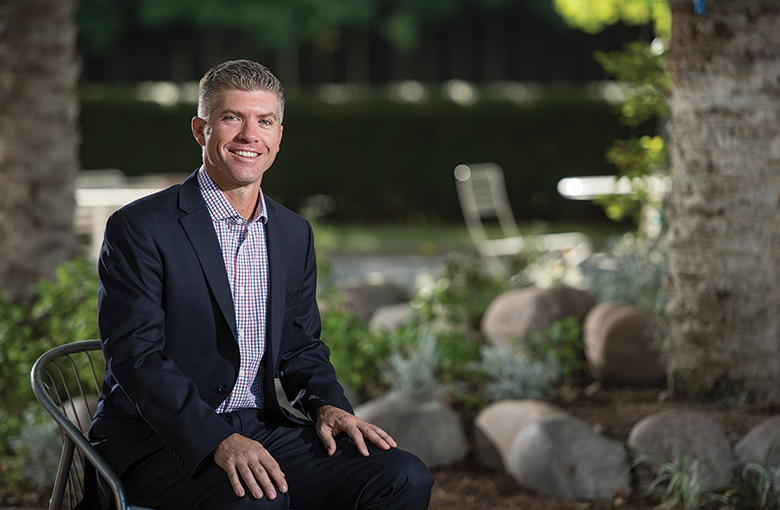
Accounting or allegiance: What really opens World Bank coffers?
Ask the 3,000 impoverished Ethiopian women who received special credit lines so they could start their own businesses: World Bank loans change lives. Just what is the World Bank? Started after World War II, it was created to help nations rebuild, says Assistant Professor of Accounting Phil Lamoreaux.
First published in the W. P. Carey magazine, Fall 2016.
Research by Phil Lamoreaux, Assistant Professor of Accounting
Ask the 3,000 impoverished Ethiopian women who received special credit lines so they could start their own businesses: World Bank loans change lives. And, they should. After all, this institution’s motto is “working for a world free of poverty.” Still, as Phil Lamoreaux points out, “World Bank has lofty stated ambitions but, at the end of the day, it loans money and it wants that money paid back.” Lamoreaux, a professor of accounting at the W. P. Carey School of Business, decided to see if getting the money back appeared to be a driving force in World Bank lending behavior. What he found was that accounting and audit quality did seem to matter, particularly when the nations looking for a loan were well known for corruption. But, even more important was the correlation between loans and another factor: the borrower nation’s geopolitical alignment with the interests of the United States.
Peas and prosperity
Just what is the World Bank? Started after World War II, it was created to help nations rebuild, Lamoreaux says. Today, the organization funds a variety of projects in middle-income and creditworthy low-income nations. Recent initiatives include backing an agricultural project that disperses seeds and seedlings to restore food security in Africa, building new health care facilities in Cambodia, bringing clean water sources to parched rural villages in India and raising literacy levels in Papua New Guinea, where nearly 40 percent of the population can’t read. “The key difference between World Bank and a commercial bank is that the commercial bank’s purpose is essentially to make money … to generate profit for shareholders,” Lamoreaux explains. “That’s a secondary objective for World Bank.” Still, World Bank does have shareholders of a sort. “Its member countries put money into the World Bank, and the U.S. is the largest investor,” Lamoreaux continues. In fact, the U.S. holds some 15 percent of shares. The next highest level of financial backing came from the United Kingdom, which has a 4-percent share.
Accounting matters
As noted earlier, World Bank lends money primarily to alleviate human suffering. So, lending rates are predicated on the length of the borrowing term rather than on default risk, which is the construct firmly behind a commercial bank’s interest rates to borrowers. Still, accounting matters, because when accounting quality is low, World Bank officials will likely need to monitor projects more closely than they would when they can rely on high-quality, audited financial statements. That adds cost to the loan. This is why Lamoreaux and his fellow researchers — Paul Michas, University of Arizona and Wendy Schultz, University of Manitoba — hypothesized that accounting quality would raise the likelihood of a nation’s aid workers getting World Bank financial support.
The researchers also thought audit infrastructure would have impact because each financed project must have an independent auditor watching cash flows. In addition, the research team examined a nation’s reputation for corruption. If it was high, they figured bank staff would be more attentive to accounting standards and audit quality. Finally, the researchers looked at whether loans were made to countries geopolitically aligned with the U.S. That’s because the U.S. is, by far, the largest of World Bank’s 189 member countries, and other researchers had already found that the bank’s lending appeared to be motivated by both economic and political forces. Specifically, other researchers looked at World Bank lending in reference to four models of motivation. The “needs model” maintains that money goes to the countries with the greatest need for aid. The “desserts model” says it goes to those nations that deserve it. The “benevolence model” holds that World Bank officials simply follow their charter, handing out funds to fulfill their goal of ending world poverty.
Finally, the “politico-economic model” posits that bank officials will use political interest as a guide. In the study focused on these lending models, researchers found that geopolitical interest “had the highest explanatory power,” Lamoreaux says. “It fit the lending data best.” As it turns out, complementary results showed up when Lamoreaux examined World Bank activity, too. Recall that his research sought to find out if accounting practices and audit quality would make a difference to World Bank officials. It did. “From what we observed in the data, the quality of information they thought they’d get back influences what they’re willing to lend.” But, he adds, “accounting and auditing only matter in countries with relatively high corruption levels.” What’s more, if there’s a nation with geopolitical interests that are aligned with those of the U.S. that, too, will raise a borrower country’s chances of getting a loan and toss the importance of accounting or audit quality aside. Lamoreaux says his findings confirm those of other researchers. “Geopolitical influences impact what World Bank does,” he concludes. When political influences are strong, “accounting and audit quality really don’t seem to matter.”
Latest news
- Gifts that give back
This holiday season, give gifts that stand out — and support the Sun Devil community — from…
- Who is the new Brazilian owner of Hickman's Family Farms?
The sale of Arizona's largest egg producer could lead to 15% higher prices due to fewer choices…
- Understanding the Fed's rate cuts: ASU professor provides insights
Will lower rates impact economic growth? A W. P. Carey finance expert weighs in.